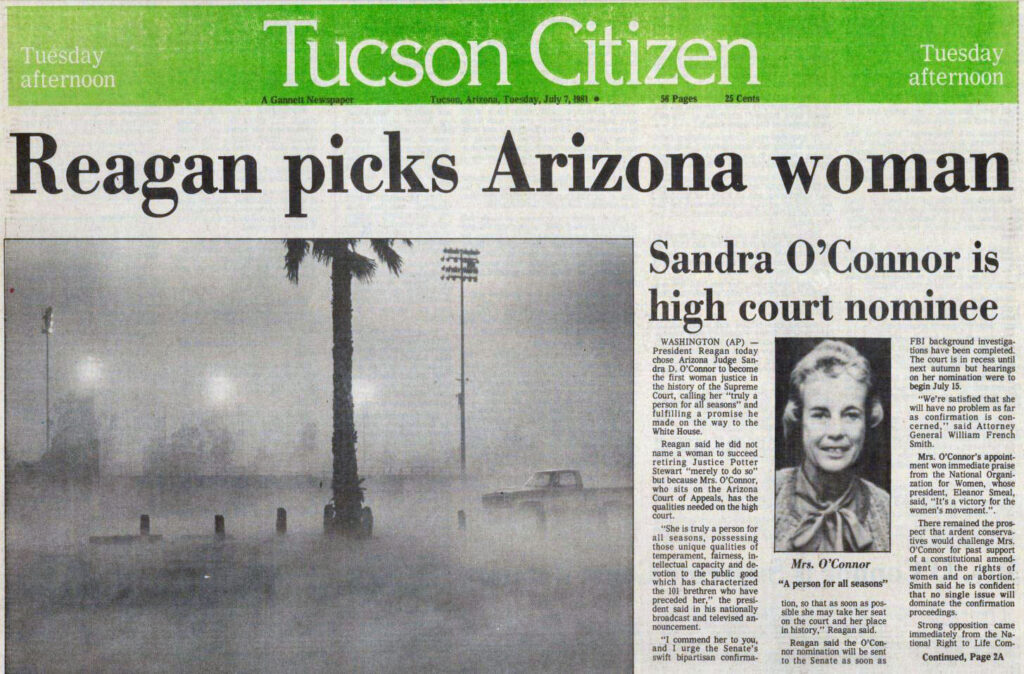O’Connor Wins 17-0 Approval of Senate Panel
WASHINGTON – The Senate Judiciary Committee Tuesday recommended by 17 to 0 that the Senate confirm Sandra Day O’Connor to be the Supreme Court’s first woman justice, with Sen. Jeremiah Denton CR-Ala.) abstaining on grounds he was uncertain about her position on abortion. Sen. Strom Thurmond (R-S.C.), the committee chairman, said after the panel’s vote that O’Connor could win the unanimous backing of the Senate when it votes on the nomination, possibly as early as Friday. Denton Undecided An aide to Denton said the senator, who ranked the abortion issue as overshadowing “virtually all other considerations,” has not made up his mind on how he will vote in the full Senate. “He’s really wrestling with this one ,” the aide said. Two other committee Republicans who expressed concern over how O’Connor would vote on the abortion question as a Supreme Court justice, Sens. John P. East of North Carolina and Charles E. Grassley of Iowa, said they based their committee votes for her partly on the belief that President Reagan knows more about her abortion views than the committee. “I suspect he (Reagan) knows some things I don’t,” East said. “I feel down in my heart of hearts that had she been on the court she would have joined Justices (William H.) Rehnquist and (Byron R.) White” in dissenting from the 1973 Supreme Court decision that held that women have a qualified constitutional right to abortion. Last week, O’Connor told the committee she generally is opposed to abortion and admitted
Past returns to haunt candidate Andy Young
WASHINGTON -The issue that finally sank Andrew Young as the Carter administration’s ambassador to the United Nations was his meeting with representatives of the Palestine Liberation Organization and, more to the point politically, the angry reaction it caused in the Jewish community . Two years later that same reaction seems to be haunting Young in his campaign for mayor of Atlanta. After several months of campaigning Young has been able to raise less than $100,000, while Atlanta’s substantial Jewish community is pouring money into one of his prime rivals, state legislator Sidney Marcus. The Marcus campaign concedes it is likely to have $500,000 to spend, and other sources suggest it may be as much as $700,000. One result is that Marcus advertising is already running on television, and has been for weeks, although the election is not until Oct. 6. Marcus is not Young’s only problem. Some Atlanta political professionals say they believe that Reginald Eaves, a controversial former public safety commissioner, has been making significant progress in winning the support of low-income blacks who credit him with halting police brutality against them. At this point, however, there are no opinion poll figures to support that thesis. * • * The White House, well aware of the unhappiness among leauing conservative and anti-abortion groups over the nomination of Sandra O’Connor to the Supreme Court, has upgraded its stroking of the New Right. James A. Baker , the White House chief of staff
Prayer suit killed in Supreme Court
WASHINGTON – The Supreme Court on Monday refused to review lower court decisions barring voluntary prayer at “optional” assemblies in the Chandler Unified School District south of Phoenix. Chandler High School Principal Howard Conley said he was disappointed by the decision. “I would suppose this is the end of the prayer issue. You can’t go any higher than the Supreme Court. We’ll certainly abide by the Supreme Court,” he said. The high court, by refusing to review the case, upheld a 1979 court ruling. Prayers were prohibited on constitutional grounds by U.S. District Judge Carl A. Muecke, who cited a 1962 Supreme Court ruling that outlawed school sponsorship of prayers. Muecke’s ruling was upheld by the 9th U.S. Circuit Court last May. The Chandler controversy originated in 1978 when Theresa Collins, the mother of two students, challenged the school’s practice of allowing the student council to open school assemblies with a prayer. The practice of opening the morning assemblies with voluntary prayer went on at the school from at least 1976-77, when Conley took over as principal, to March 1979 when the District Court made its ruling. Conley said he thought the Supreme Court might allow the prayers in Chandler High School because of the “different way” they were presented at the school. Prayers were given during non-mandatory assemblies by decision of the students, he said. “Our assemblies are organized, developed and administered by students. “It was not a state prayer, Methodist

